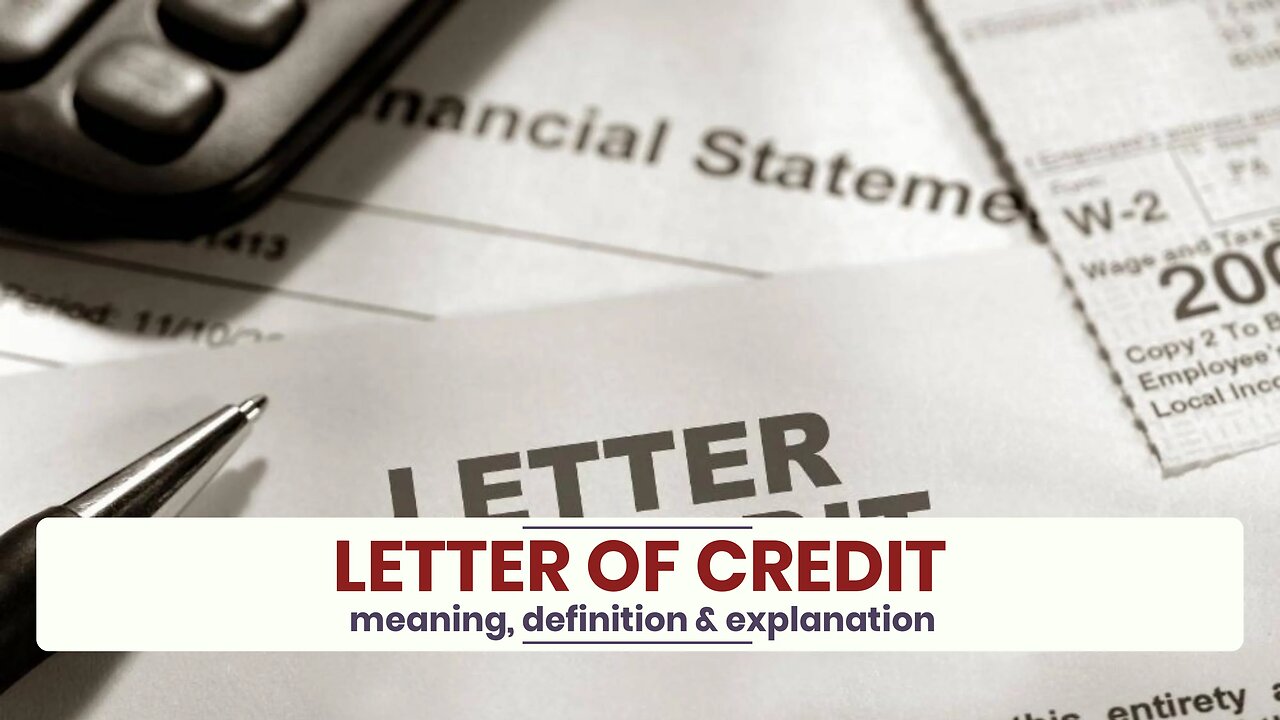Premium Only Content

What is LETTER OF CREDIT?
✪✪✪✪✪
http://www.theaudiopedia.com
✪✪✪✪✪
What does LETTER OF CREDIT mean? LETTER OF CREDIT meaning - LETTER OF CREDIT definition - LETTER OF CREDIT explanation. What is the meaning of LETTER OF CREDIT? What is the definition of LETTER OF CREDIT? What does LETTER OF CREDIT stand for? What is LETTER OF CREDIT meaning? What is LETTER OF CREDIT definition?
In modern business practice, a letter of credit is a written undertaking from a bank to pay a beneficiary against the delivery of a specified set of documents.
A letter of credit is a method of payment, considered less secure than payment in advance but more secure than documentary collections and open account from the seller's point of view. From the buyer's point of view it offers more security than payment in advance but less security than documentary collections or open account terms.
However, it is generally considered that Letters of Credit (otherwise known as "Documentary Credits") offer a good balance of security between the buyer and the seller, because both the buyer and seller rely upon the security of banks and the banking system to ensure that payment is received and goods are provided. In a Letter of Credit transaction the goods are consigned to the order of the issuing bank, meaning that the bank will not release control of the goods until the buyer has either paid or undertaken to pay the bank for the documents.
In the event that the buyer is unable to make payment on the purchase, the seller may make a demand for payment on the bank. The bank will examine the beneficiary's demand and if it complies with the terms of the letter of credit, will honor the demand. Most letters of credit are governed by rules promulgated by the International Chamber of Commerce known as Uniform Customs and Practice for Documentary Credits. The current version, UCP600, became effective July 1, 2007.
The name "letter of credit" derives from the French word "accréditation", a power to do something, which derives from the Latin "accreditivus", meaning trust.
After a sales contract has been negotiated and letter of credit has been agreed upon as the method of payment, the Applicant will contact a bank to ask for a letter of credit to be issued, and once the issuing bank has ascertained that the Applicant will be able to pay for the goods it will issue the letter of credit. Once the Beneficiary receives the letter of credit it will check the terms to ensure that it matches with the contract, and will either arrange for shipment of the goods or ask for an amendment to the letter of credit so that it meets with the terms of the contract. The letter of credit is limited by time, in terms of the validity of the credit, the latest date of shipment, and in terms of how long after shipment the documents may be presented to the Nominated Bank.
Once the goods have been shipped, the Beneficiary will present the set of requested documents to the Nominated Bank. This bank will check the documents, and if they comply with the terms of the Letter of Credit the Issuing Bank is bound to honour the terms of the letter of credit by paying the Beneficiary.
If the documents do not comply with the terms of the letter of credit they are considered Discrepant. At this point the Nominated Bank will inform the Beneficiary of the discrepancy and offer a number of options depending on the circumstances. If the discrepancies are minor it may be possible to present corrected documents to the bank to make the presentation compliant. Documents presented after the time limits mentioned in the credit are also considered discrepant.
If corrected documents cannot be supplied in time the documents may be forwarded to the issuing bank "in trust"; effectively in the hope that the Applicant will accept the documents. Documents forwarded in trust remove the payment security of a letter of credit so this route must only be used as a last resort.
Some banks will offer to "Telex for Approval" or similar. This is where the Nominated Bank holds the documents, but sends a message to the Issuing Bank to accept the discrepancies. This is more secure than sending documents in trust.
-
 1:41
1:41
The Audiopedia
8 months agoWhat is PUBLIC DEBT?
53 -
 47:50
47:50
Candace Show Podcast
6 hours agoBREAKING: Judge Makes Statement Regarding Taylor Swift's Text Messages. | Candace Ep 155
94.3K105 -
 DVR
DVR
Josh Pate's College Football Show
3 hours agoCFB’s Most Hated Teams | FSU & Clemson Future | Big Ten Win Totals | Star Rankings Overrated?
5.76K -
 1:33:47
1:33:47
CatfishedOnline
4 hours agoGoing Live With Robert - Weekly Recap
19.4K -
 55:18
55:18
LFA TV
1 day agoEurope’s Sudden Turn Against America | TRUMPET DAILY 3.6.25 7PM
25.5K3 -
 4:21
4:21
Tundra Tactical
4 hours ago $1.38 earnedPam Bondi MUST Enforce Due Process NOW!
18.4K1 -
 56:42
56:42
VSiNLive
5 hours agoFollow the Money with Mitch Moss & Pauly Howard | Hour 1
43.6K1 -
 1:05:32
1:05:32
In The Litter Box w/ Jewels & Catturd
1 day agoShalom Hamas | In the Litter Box w/ Jewels & Catturd – Ep. 756 – 3/6/2025
98.7K37 -
 1:23:00
1:23:00
Sean Unpaved
7 hours ago $2.98 earnedNFL Free Agency
50.9K3 -
 18:25
18:25
Stephen Gardner
6 hours ago🔥The REAL REASON the Epstein Files are being HIDDEN | I CONFRONT Alan Dershowitz for details!
63.3K110